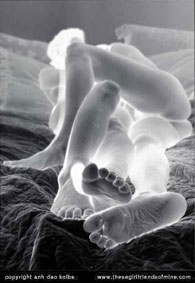Women who have sex with women (WSW) are sometimes not informed about their risks for HPV, cervical cancer, and are often told they don't need regular Pap tests, according to a study published in the August issue of the Health Promotion Journal of Australia.

Regular Pap screenings can save your life. Early detection is key to fighting cervical cancer. "The reason for alarm is that most women who die from cervical cancer have not had regular Pap tests," according to Kate Broun, Manager of PapScreen Victoria.
HPV does not require penetration to pass between partners, it spreads between sexual partners during close skin to skin contact. Research shows that HPV is transmitted sexually between female partners.
Results from international research suggests that as many as one in five lesbians who've never had sex with men are being infected with HPV, a press release from the Health Promotion Journal of Australia stated.
You should have your first cervical screening within about three years of your first sexual encounter or by the age of 21. Most women between the ages of 21 and 30 should have a Pap test at least once a year, according to the latest recommendations from the American College of Obstetrics and Gynaecology. Women over 30 may require screenings less often.
There is evidence that 90 percent of the most common type of cervical is preventable with two yearly screening, however only two thirds of Australian women are doing so.
Lesbians having regular Pap smears were much more likely to visit health care providers who knew about their sexual orientation, and who were sensitive to gay and lesbian health needs compared to those not having regular pap tests.
Research has demonstrated that HPV is not the only sexually transmitted infection WSW need to worry about.
In a study published in the October 2000 issue of the Journal of Sexually Transmitted Diseases, WSW demonstrated a significantly higher prevalence of bacterial vaginosis (BV), hepatitis C, and HIV risk behaviours compared to non-WSW. "The assumption that women who engage in sex with other women are not at risk of STIs is clearly incorrect," said Katherine Fethers, M.D., lead author of the study from the Sexual Health Unit at Alice Springs Hospital in Australia.
A total of 1,408 women who reported ever having sex with another woman were compared with 1,423 women who had never had sex with a woman. The women had all attended the Sydney Sexual Health Centre between 1991 and 1998. Only seven percent of the WSW or 283 women reported no sex with a male in the past 12 months (exclusive WSW) - 25 percent of these WSW reported never having had sex with a man.
For more information about Pap screenings visit the web site PapScreen Victoria at www.papscreen.org.
